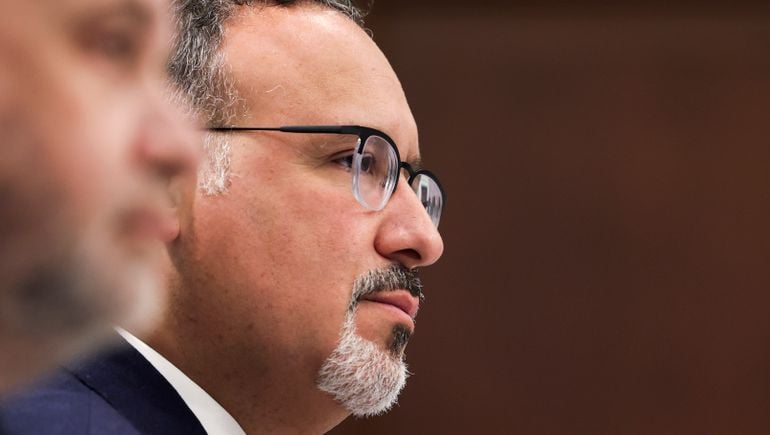The U.S. Department of Education announced Monday that it plans to send federal financial aid personnel to lower-resourced colleges to help smooth the rollout of the new Free Application for Federal Student Aid.
The Education Department released the FAFSA on Dec. 30, nearly three months later than usual. The delay was intended to give the agency time to simplify the form, paring down the number of maximum questions from over 100 to several dozen.
But the form’s rollout has been beset by technical glitches and last-minute changes. Most recently, the Education Department said it wouldn’t transmit FAFSA applicant data to colleges until March — a move that has already prompted some institutions to push back their traditional student commitment deadline of May 1.
“I understand delays have been frustrating for institutions,” U.S. Education Secretary Miguel Cardona said during a call with reporters Monday. “They’ve been frustrating for me too. But let’s keep in mind that we’re completely overhauling a broken system — a system that’s older than me and based on COBOL, a coding language many institutions stopped using decades ago.”
To aid with the transition, the Education Department plans to send federal financial aid experts to select colleges with relatively few resources to ensure they have the tools needed to process financial aid packages.
The department expects the initiative to benefit historically Black colleges and universities, tribal colleges and other lower-resourced institutions. A senior department official said the agency did not yet have an exact number of institutions expected to benefit.
Colleges will have an opportunity to reach out to the Education Department to seek support, the senior department official said. The agency also may proactively reach out to colleges that officials think could struggle more with the new FAFSA.
At least 50 Federal Student Aid personnel will be deployed to colleges, the senior department official said.
Staff will be sent to colleges within the next three weeks.
“But we do also anticipate there are going to be continued needs that colleges are going to have past March as they process applications and get aid offers out the door,” the official said. “This is an effort that we look [at] as something that is going to be over the next couple months.”
The Education Department also plans to distribute $50 million to nonprofits specializing in financial aid support.
They will use those federal funds to recruit financial aid professionals to provide further technical assistance to colleges, such as helping with training their staff, creating aid packages and meeting compliance requirements.
The Educational Credit Management Corp., a guaranty agency and financial education services provider, will administer the funding to nonprofits. The National Association of Student Financial Aid Administrators said it was one of the nonprofits selected, according to a Monday statement.
“These are some of the biggest changes facing the financial aid profession — not to mention students and families — in decades, and it will take cooperation, clear communication, and mutual trust among all stakeholders to get us over the finish line,” Justin Draeger, NASFAA’s president and CEO, said in a statement. “We are eager to begin this work and look forward to sharing more details soon.”
Additionally, the Education Department will send test versions of FAFSA applicant data within the next two weeks so colleges and state agencies can ensure their systems are ready.
Department officials acknowledged Monday that some students still can’t complete the online FAFSA form. For instance, students whose parents don’t have Social Security numbers have been unable to complete the form — an error that is harming immigrant families.
“That we need to make the online form available to them is a very, very high priority for us,” a senior department official said. “I don’t have a specific timeline, but I can tell you that we are working on it with a great deal of urgency.”
